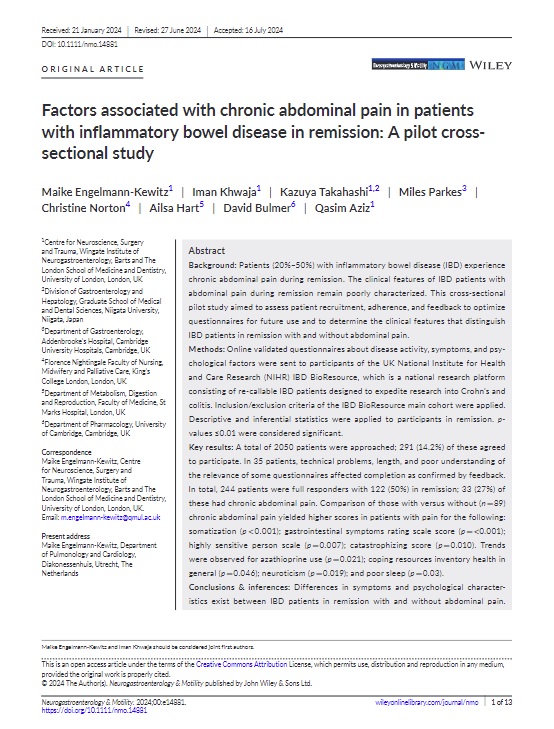Risk factors of chronic pain in patients with Inflammatory bowel disease
Study code
NBR131
Lead researcher
Prof Qasim Aziz
Study type
Participant re-contact
Institution or company
Wingate Institute for Neurogastroenterology, Queen Mary University of London
Researcher type
Academic
Speciality area
Gastroenterology, Anaesthesia, Perioperative Medicine and Pain Management

Summary
Background
Abdominal pain is a common symptom in patients with inflammatory bowel disease (IBD). Up to 70 % of IBD patients experience pain when the disease is active. Even when patients with IBD are in remission, 20-50 % of patients experience ongoing pain. The precise mechanism of developing chronic abdominal pain in patients with IBD in remission remains unknown.
The aim of this study is to identify psychophysiological and biological risk factors for the development of chronic abdominal pain in patients with newly diagnosed IBD. We will then use cutting edge techniques in machine learning to ascertain if artificial intelligence can predict the development of chronic abdominal pain.
Study design
This study consists of 4 sections (Study 1A, 1B, 2, and 3).
Study 1A: We will perform a longitudinal study in 150 patients with new-onset IBD (ulcerative colitis and Crohn's disease) over 18 months. We will ask the participants to answer online questionnaires and record heart rate using a mobile app every 6 months. We will also ask them to participate in the IBD BioResource 'Inception study' as well. Data collected by the IBD BioResource 'Inception study' will be used in the analysis.
Study 1B: 450 patients who are newly registered in the 'Inception study' will be recruited and followed for at least 12 months. We will ask them to answer online questionnaires every 6 months. Data collected by the IBD BioResource 'Inception study' will be used in the analysis.
Study 2 and 3: Study 2 and 3 are a questionnaire-based cross-sectional studies in patients with IBD (both Crohn's disease and ulcerative colitis patients). The participants for study 2 are patients who are registered in the 'IBD BOOST study', and those for study 3 are patients who are registered in IBD BioResource (but not in the 'IBD Boost study'). We will ask them to answer online questionnaires once.
Research publication
Engelmann-Kewitz M, Khwaja I, Takahashi K, Parkes M, Norton C, Hart A, Bulmer D, Aziz Q. Factors associated with chronic abdominal pain in patients with inflammatory bowel disease in remission: A pilot cross-sectional study. Neurogastroenterol Motil. 2024 Jul 30:e14881. (link)
Key results
A total of 2,050 patients were approached; 291 (14.2%) of these agreed to participate. In 35 patients, technical problems, length, and poor understanding of the relevance of some questionnaires affected completion as confirmed by feedback. In total, 244 patients were full responders with 122 (50%) in remission; 33 (27%) of these had chronic abdominal pain. Comparison of those with versus without (n = 89) chronic abdominal pain yielded higher scores in patients with pain for the following: somatization (p < 0.001); gastrointestinal symptoms rating scale score (p = <0.001); highly sensitive person scale (p = 0.007); catastrophizing score (p = 0.010). Trends were observed for azathioprine use (p = 0.021); coping resources inventory health in general (p = 0.046); neuroticism (p = 0.019); and poor sleep (p = 0.03).
Conclusions & inferences
Differences in symptoms and psychological characteristics exist between IBD patients in remission with and without abdominal pain. Confirmation of findings in larger studies may facilitate development of personalized chronic pain treatments for IBD patients.
